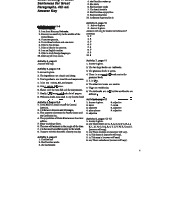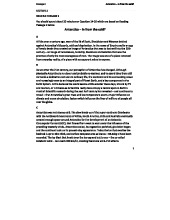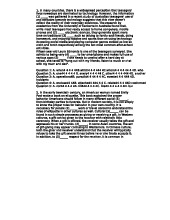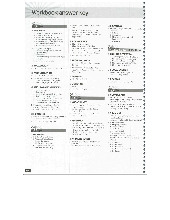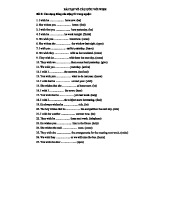









Preview text:
UNIT 1: FAMILY LIFE PART I: THEORY A. VOCABULARY New words (Từ mới) Words Type Pronunciation Meaning benefit (n) /ˈbenɪfɪt/ lợi ích bond (n) /bɒnd/ sự gắn bó breadwinner (n) /ˈbredwɪnə(r)/ trụ cột gia đình celebrate (v) /ˈselɪbreɪt/ tổ chức tiệc achievement (n) /əˈtʃiːvmənt/ thành tựu appreciate (v) /əˈpriːʃieɪt/ biết ơn, trân trọng character (n) /ˈkærəktə(r)/ tính cách cheer up (v) /tʃɪə(r) ʌp/ làm cho vui lên, cổ vũ choice (n) /tʃɔɪs/ lựa chọn cook (v) /kʊk/ nấu ăn damage (v) /ˈdæmɪdʒ/ phá hỏng difficulty (n) /ˈdɪfɪkəlti/ vấn đề khó khăn discuss (v) /dɪˈskʌs/ thảo luận divide (v) /dɪˈvaɪd/ chia fair (adj) /feə(r)/ công bằng gratitude (n) /ˈɡrætɪtjuːd/ lòng biết ơn grocery (n) /ˈɡrəʊsəri/ thực phẩm và tạp hóa grow up (v) /ɡrəʊ ʌp/ trưởng thành heavy lifting (n) /ˌhevi ˈlɪftɪŋ/ mang vác nặng homemaker (n) /ˈhəʊmmeɪkə(r)/ người nội trợ honest (adj) /ˈɒnɪst/ thật thà /ˈhaʊshəʊld household chore (n) công việc nhà tʃɔː(r)/ housework (n) /ˈhaʊswɜːk/ công việc nhà instead of (adv) /ɪnˈsted əv/ thay cho laundry (n) /ˈlɔːndri/ quần áo, đồ giặt là life skill (n) /ˈlaɪf skɪl/ kĩ năng sống list (n) /lɪst/ danh sách manage (v) /ˈmænɪdʒ/ xoay sở manner (n) /ˈmænə(r)/ tác phong, cách ứng xử prepare (v) /prɪˈpeə(r)/ chuẩn bị 20 put out (v) /pʊt aʊt/ vứt raise (v) /reɪz/ nuôi nấng respect (n) /rɪˈspekt/ sự tôn trọng responsibility (n) /rɪˌspɒnsəˈbɪləti/ trách nhiệm result (n) /rɪˈzʌlt/ kết quả routine (n) /ruːˈtiːn/ công việc hằng ngày rubbish (n) /ˈrʌbɪʃ/ rác rưởi spotlessly (adv) /ˈspɒtləsli/ không tì vết strengthen (v) /ˈstreŋkθn/ củng cố, làm mạnh success (n) /səkˈses/ sự thành công support (n, v) /səˈpɔːt/ sự ủng hộ, hỗ trợ value (n) /ˈvæljuː/ giá trị washing-up (n) /ˌwɒʃɪŋ ˈʌp/ việc rửa chén bát task (n) /tɑːsk/ nhiệm vụ truthful (adj) /ˈtruːθfl/ trung thực B. GRAMMAR
I. Present simple and present continuous. (Thì hiện tại đơn và thì hiện tại tiếp diễn)
1. Công thức, dấu hiệu cách sử dụng
Present simple (Hiện tại đơn)
Present Continuous (Hiện tại tiếp diễn) Công thức Công thức (+ S + Vs, es/ V1
(+ S + is/ are/ am + V-ing ) )
(-) S + do/ does + not + V1
(- S + is/ are/ am + not + V-ing (? Do/ Does + S ) )
(? Is/ Are/ Am + S + V-ing? ) Cách dùng Cách dùng
- Hành động lặp đi lặp lại theo thói quen
- Hành động đang diễn ra tại thời
- Hành động lâu dài, bền vững điểm nói
- Lịch trình, thời khóa biểu - Tình cảm, cảm
- Hành động tạm thời xảy ra xúc
- Chân lý, sự thật hiển nhiên đúng
- Kế hoạch trong tương lai gần Dấu hiệu Dấu hiệu
- always, usually, often, sometimes, rarely,
- Look! / Listen! / Be quiet! / Be
seldom, occasionally, never, . .
careful! / Don't make noise! / Keep
- every day/week/ month/ year, … silent!
- on Mondays/ Tuesdays, Sundays, . .
- now, right now, at the moment, at the
- once/ twice / three times a week/ month present, . .
- every two weeks, every three months, . .
- today, these days, this week, this month, ... Chú ý Chú ý
Vị trí trạng từ tần suất (always,
Is/ Are/ Am + always/ forever + 20
usually, often, sometimes, seldom, V-ing
- Diễn tả hành động xảy ra quá thường rarely, never)
xuyên và mang lại cảm giác khó chịu
- Trước động từ thường
You are always stepping on my foot.
I often go out with my friends in the evening. - Sau động từ to be
I am never late for school.
- Giữa trợ động từ và động từ thường
He doesn't always get up early in the morning.
2. Các động từ không chia tiếp diễn Senses / feel hear see smell taste Perception assume believe consider think Opinion find (= suppose feel doubt consider) forget imagine know mean Mental states notice recognize remember understand want/ Emotions / fear dislike/ hope wish desires need hate like love mind prefer regret Measurement contain/ cost hold measure weigh consist look be depend Others seem/ belong have appear
* Lưu ý: Những động từ này có thể sử dụng với thì tiếp diễn nhưng chúng mang ý nghĩa khác. This coat feels nice and warm.
John's feeling much better now. (His health is improving). She has three dogs and a cat.
She's having supper. (She's eating). (Possession)
I can see Anthony in the garden.
I'm seeing Anthony later. (We are planning to (Perception) meet) PART II: LANGUAGE A. PHONETIC
Exercise 1. Find the word which has a different sound in the part underlined. 1. A. public B. globe C. brother D. climb 2. A. bull B. but C. son D. fun 3. A. clock B. secret C. specific D. education 4. A. children B. member C. content D. special 5. A. team B. patient C. between D. later 6. A. mum B. fun C. huge D. rubbish 7. A. heavy B. ready C. bread D. break 8. A. parents B. careers C. rings D. couples 20 9. A. establish B. significant C. financial D. economic 20 10. A. enjoyed B. developed C. prepared D. transformed
Exercise 3. Find the word whose main stress is different from others. 1. A. standard B. argue C. debate D. decade 2. A. amount B. adopt C. attend D. option 3. A. household B. laundry C. routine D. picnic 4. A. similar B. important C. atmosphere D. breadwinner 5. A. discipline B. emotion C. together D. consider 6. A. export B. knowledge C. technical D. resurface 7. A. society B. encouragement. C. relationship D. independent 8. A. provide B. private C. arrange D. advise 9. A. indicate B. forefinger C. procedure D. enemy 10. A. tiredness B. contribute C. benefit D. nursery
B. VOCABULARY & GRAMMAR
Exercise 1. Fill in each blank with a suitable word or phrase from the box. breadwinner housework groceries homemaker heavy lifting responsibility gratitude strengthen family bond duty
1. Each of us must take. . . . . . . . . . . . . . . .for our own actions.
2. How much do men share. . . . . . . . . . . . . . and the care of the children?
3. Mothers have been leaving the traditional role of fulltime . . . . . . . . . . . . .
4. Do your. . . . . . . . . . to your parents because they have given their entire lives to us.
5. A. . . . . . . . . . . . . is the strong connection that exists between family members.
6. The supermarket donated a year’s supply of. . . . . . . . . . . to one needy family.
7. We wish to show our. . . . . . . . . . and thanks with a small gift. Happy Teacher’s Day!
8. This is a special set of exercises which will. . . . . . . . . . . . your back muscles.
9. One of the causes of low back pain is poor lifting technique or frequent and ... . . . . .. . . .
10. Women in the past have been content to let the man be the. . . . . . . . . . . . and head of household.
Exercise 2. Fill in each blank with the correct word below. bonds benefits example laundry washing-up breadwinner chores role
1. Mr Long has found that his wife receives a great deal of love when he shares household .................
2. In fact, childcare seems to have some important. . . . . . . . . . . .for young children.
3. My mother was hanging out the. . . . . . . . . . . . . in the sun.
4. . . . . . . . . .in the extended family are generally very close.
5. Mothers play an enormous. . . . . . . . . . in the lives of their children and the bond is very strong.
6. You should set a good. . . . . . . . . . . . . . . for your little brother.
7. Traditionally, the. . . . . . . . . . . . . . in the home is the father.
8. Every day at 7 pm, dinner is finished and the. . . . . . . . . . . . . . . . is done.
Exercise 3. Choose the correct words.
1. Everyone in my family shares the cooking and domestic chores / housework.
2. Women became managers / breadwinners while their husbands went to fight in the war
3. Yesterday she went to the supermarket to buy the laundry / groceries and flowers. 20
Downloaded by Nguyen Linh (vjt9@gmail.com)
4. For this exercise, the teacher is going to divide / make the class into tour groups.
5. You should tidy up / away your room at the weekend.
6. My sister did the laundry / groceries and hung wet clothes out to dry
7. My grandfather can’t do heavy lifting / loud voice because he has a bad back.
8. Every day after dinner I do the routine / washing-up before 1 do tny homework
9. My dad is the breadwinner / game-winner. He goes to work to support the family
10. My sister tries to get some simple basic home cook / cooking from my mother
Exercise 4. Choose the best option A, B, C or D.
1. Studies show that doing chores is good for children. A. regular B. regularly C. regularity D. regularities
2. Housework is work around the house such as cleaning or washing clothes. A. cook B. cooks C. cooker D. cooking
3. They have to try to finish their tasks they don’t enjoy doing them. A. despite B. indeed C. although D. because
4. Parents will be able to see the classes broadcast on the internet. A. live B. life C. living D. lives
5. Children need to learn to take care other family members. A. of B. to C. for D. with
6. Jessica always quibbles about affairs with her mother. A. homework B. homemaker C. household D. housewife 7. Her dad usually
a bedtime story to her and her brother. A. read B. is reading C. reads D. doesn’t read
8. His parents always listen to him and whenever he has problems. A. cheer up he B. cheer up him C. cheer he up D. cheer him up 9. I
outside with my friends now because it. A. am playing - rains B. am not playing - is raining C. am not playing - rains D. don’t play - is raining
10. Is it true that women more assertive in the past decade? A. have become B. became C. become D. are becoming 11.The kid feels
that he knows how to run a washing machine. A. proud B. pride C. proudly D. prideful
12. The material has exceptionally high for its weight. A. strong B. strength C. strongly D. strengthen
13. Your living is determined so much by the attitude you bring life. A. to B. from C. on D. in
14. The point of the program is to empower young fathers with skills. A. parenting B. parented C. parents D. parent
15. Family values define what is
to your family - the beliefs and ideas that bind your family together. A. mean B. meaning C. meaningful D. meaningfully
16. On the top of British family values are the values of truthful and honest. A- be B. to be C. been D. being 17. To
responsibility is to accept the duty of deciding for oneself what is right. A. make B. take C. get D. have
18. In this photo, my grandfather beside a lake near my house. A. is walking B. walks C. was walking D. walked 19. I tired now. I think I at home and watch TV tonight. A. am - will stay B. will be - will stay C. am - am staying D. am - stay 20. I
my grandparents in the countryside next week. I can’t wait! A. visit B. will be visiting C. will visit D. am going to visit 20
Exercise 5. Choose the answer which is CLOSEST in meaning to the underlined words.
1. The custom of worshipping ancestors is prevalent among Vietnamese people. A. popular B. rare C. regular D. communal
2. It is very difficult to define the concept of beauty. A. context B. notion C. proof D. reality
3. The more successful we are at extending longevity, the more it will cost us. A. endurance B. durability C. year D. life expectancy
4. They have very definite ideas on how to bring up children. A. bear B. feed C. raise D. teach
5. The number of children and the family dynamics have changed over time. A. extents B. norms C. standards D. motions
Exercise 6. Choose the answer which is OPPOSITE in meaning to the underlined words.
1. These problems demonstrate the importance of strategic targets. A. critical B. vital C. key D. unplanned
2. I’m sure that his parents won’t allow him to stay out late. A. permit B. admit C. ban D. grant
3. Each school should evolve its own way of teaching during the pandemic. A. decrease B. develop C. leave D. diminish
4. Individuals can enrol on self-study courses in the university’s institute. A. group B. entity C. privacy D. persons
5. Nowadays many women refuse to take on the traditional woman’s role. A. classic B. modern C. ancient D. old
Exercise 7. Supply the correct form of the word in the brackets.
1. For a small woman, she has surprising . . . . . . . . . (strong)
2. They relied ............... on the advice of their grandparents. (heavy)
3. She doesn’t have to do anything except. . . . . . . . a little. (cook)
4. The kitchen was ................... clean, with nothing out of place. (spot)
5. The book provides ................. information on recent trends. (value)
6. No one can tell you what book to buy - that’s a . . . . . . . . .choice. (person)
7. You should make friends with whom you share common. . . . . . . . . . . . . . . (interest)
8. . . . . . . . . . . . . . .housework helps young people learn to be more responsible. (Share)
9. Teenagers need love, ................... and reassurance from their parents. (encourage)
10. Cycling is highly .................... to health and the environment. (benefit)
Exercise 8. Choose the underlined words that need correction.
1. There is no question that life for women is more difficult than life for man. A B C D
2. Family life had completely transformed during generations since the rise of technology. A B C D
3. Technology makes our lives easier and it makes us to feel like we are more in touch with the world. A B C D
4. Family life may have changed but family values today remain as strongly as they were. A B C D
5. Women have attained immense succeed in every field, whether it is sports, politics or academics. 20 A B C D
Exercise 9. Read the passage and choose the best answer A, B, C or D to each question.
Comparing society 40 years back to activities and happenings of today, I appreciate that
family values have changed over time. In our world today, a lot of vices are holding sway and
these vices are quickly displacing virtues because we have compromised family values.
Today children are growing up in a society that is technologically driven and are learning
at a much faster pace than in the 70s. The fast pace of learning has kept parents lagging in
getting a hold of their kid’s moral values and helping them understand what family values used to be.
Family values have changed over time from my perspective, seeing all that is happening
in our world today. To better appraise this conclusion let us understand the definition of
family values. Family values are traditional values that are passed on from generation to
generation within the family that address the family roles, family structure, function,
attitude, and ideas. These traditional values are like unwritten codes that guide the actions
of individuals. They help people decide what is right or wrong.
The family is a powerful institution with tremendous influence on society, and when these
family values become promoted by parents within the family, society will feel the effect.
1. What is the main topic of the passage?
A. Family Values have changed over time.
B. Traditional values have lost.
C. Family values in modern society become better. D. What are traditional family values?
2. In the first paragraph, why does the author mention that a lot of vices are holding sway?
A. Because family values have changed over time.
B. Because we have compromised family values.
C. Because virtues are being displaced.
D. Because so many things have changed for 40 years.
3. The second paragraph is mainly about .
A. the importance of technology
B. the fast pace of modern life
C. the fast pace of life in the 70s
D. the impact of the fast pace of learning
4. The word “driven” in the second paragraph is closest in meaning to . A. transported B. turned C. oriented D. controlled
5. The word “codes” in the third paragraph can be best replaced with . A. laws B. manners C. etiquettes D. habits
6. Which of the following statements is true according to the third and the fourth paragraphs?
A. Family values are any values that are passed on from generation to generation.
B. Family values can be passed outside the family as long as they address the family
roles, family structure, function, attitude, and ideas.
C. Traditional family values guide the actions of individuals which help them decide what is right or wrong.
D. The society won’t be affected if family values become promoted by parents within the family.
Exercise 10. Read the passage and choose the best option A, B, C or D.
Have you ever wondered, “What is social change?” You’ve probably heard of the term
thrown around before, or maybe you even (1)
about it briefly in school. Social change
may have several definitions and it is very complex. (2) , as humans living in 20
this world, understanding social change and how it has played a role in our lives (3) ,
will allow us to spur social change now and in the future.
Social change can be defined as the way in which human interactions, relationships,
behaviour patterns, and cultural (4)
change over time. These changes ultimately
transform cultural and social institutions, concepts, and rules, which will inevitably impact
society for the long-haul. These changes and (5)
are not necessarily good or bad, but
they are profound. On the surface, we may not notice social change; it can take years - (6)
centuries - of action to cause one change.
As students and members of a rapidly changing society, it’s important to (7) on
social changes of the past and how they’ve influenced US now. For instance, at one point,
women were not able to study at university. Today, both men and women, of all races,
religions, nationalities, and creeds, can study - even online and tuition-free. This is why social change is (8)
. Without social change, we cannot progress as a society. 1. A. made B. worked C. taught D. learned 2. A. Instead B. Because C. Yet D. Although 3. A. historically B. historical C. historian D. history 4. A. standards B. levels C. norms D. scales
5. A. transformations B. transportations C. transactions D. transitions 6. A. like B. even C. so D. rather 7. A. look forward B. look after C. look up D. look back 8. A. weak B. important C. inessential D. worthless
Exercise 11. Combine the pairs of sentences using the words in the brackets.
1. It was a boring film. I fell asleep. (such) ➔ It was
2. I will wait. My mother comes to pick me up. (until) ➔I will
3. She trusts Robert. He is kind and honest. (because) ➔ She
4. Kimberly went upstairs. It was bedtime. (for) ➔ Kimberly
5. It’s a good idea. It’s also dangerous. (however) ➔ It's
6. Carson is intelligent. Elena is more intelligent. (than) ➔ Elena
7. I bought this headphone. Five years have passed. (for) ➔ I
8. He doesn’t like school. He doesn’t like being at home. (nor) ➔ He
Exercise 12. Complete the second sentence using the words in the brackets.
1. The new secretary doesn't type well. (at) ➔ The new secretary
2. Susan left but she didn’t say goodbye to us. (without) ➔ Susan left
3. We don’t want to talk about it anymore. (prefer) ➔ We prefer
4. The last time Ms. Nhung came here was in 2021. (since) ➔ Ms. Nhung hasn’t
5. I think that I might fail the history test. (afraid). ➔ I’m
6. Switch off all the lights, then you can leave. (before) 20 ➔ Switch off
7. He says he may grow flowers in the garden. (interested) ➔ He says
8. I haven’t gone to a Thai restaurant for months. (went) ➔ It’s months 20
Document Outline
- Exercise 2. Fill in each blank with the correct w
- Exercise 3. Choose the correct words.
- 20
- Exercise 4. Choose the best option A, B, C or D.
- Exercise 5. Choose the answer which is CLOSEST in
- Exercise 6. Choose the answer which is OPPOSITE in
- Exercise 7. Supply the correct form of the word in
- Exercise 8. Choose the underlined words that need
- Exercise 9. Read the passage and choose the best a
- Exercise 10. Read the passage and choose the best
- Exercise 11. Combine the pairs of sentences using
- Exercise 12. Complete the second sentence using th
- ➔The new secretary
- ➔Susan left
- ➔We prefer
- ➔Ms. Nhung hasn’t
- ➔I’m
- ➔Switch off
- ➔He says
